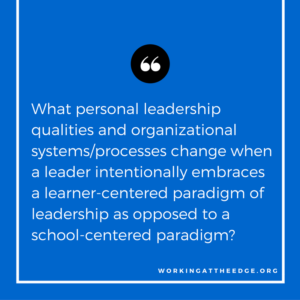 As a practitioner, I know transforming an organization for deeper learning (moving from school-centered to learner-centered) is not easy. As an observer of my own practice and the practice of other educational organizations seeking transformation, there are many reasons why it’s difficult to gain momentum, some of which include instability in organizational leadership, volatility in the policy arena resulting in shifting/conflicting mandates, and (as mentioned in a recent HBR article) a lack of personal leadership transformation. This last barrier – ourselves – is what we have most control over as leaders, and what I find most intriguing.
As a practitioner, I know transforming an organization for deeper learning (moving from school-centered to learner-centered) is not easy. As an observer of my own practice and the practice of other educational organizations seeking transformation, there are many reasons why it’s difficult to gain momentum, some of which include instability in organizational leadership, volatility in the policy arena resulting in shifting/conflicting mandates, and (as mentioned in a recent HBR article) a lack of personal leadership transformation. This last barrier – ourselves – is what we have most control over as leaders, and what I find most intriguing.
For executives to succeed in leading organizational transformations, they must begin with their personal transformation. And that starts with identifying and “re-scripting” those operative narratives that might provoke unproductive behavior. (from Organizations Can’t Change If Leaders Can’t Change with Them.)
Elevating the leadership conversation
Let’s pose a few questions for inquiry using Warren Berger’s three-question framework: Why…? What if…? How might…?
Why is personal transformation of leadership missing in systemic transformation conversations? Lack of awareness? Lack of will/effort? Lack of critical thinking about practice?
What if edleaders transformed themselves to model and mirror the transformation sought for the classroom and total organization? Would transformation in the organization look different? Would the rate of change be altered?
How might edleaders begin this personal journey of transformation, leading a system-wide transformation toward deeper learning? How might leaders begin identifying and re-scripting unproductive operative narratives?
Having recently worked with stakeholders to develop a Profile of a Graduate and identify organizational learning beliefs, I have become very curious about the differences between leading a learner-centered paradigm of education and a more traditional school-centered paradigm. It would appear personal leadership transformation plays a part. Here’s my big question (in addition to the ones above) to explore/unpack further in future posts and podcasts….
What personal leadership qualities and organizational systems/processes change when a leader intentionally embraces a learner-centered paradigm of leadership as opposed to a school-centered paradigm?
Connect with Randy on Twitter and on the TLTalkRadio podcast!
Get new content delivered to your inbox and the ebook 3 Key Principles of Digital Transformation. The ebook contains valuable information from my experience leading a digital transformation and working with a variety of stakeholders over the past decade.
- A silver lining - January 22, 2022
- Is our use of tech working against us? 🤔 - September 8, 2021
- What’s NOT going to change in the next 10 years? 🤔 - September 7, 2021
[…] my last blog, I posed this […]